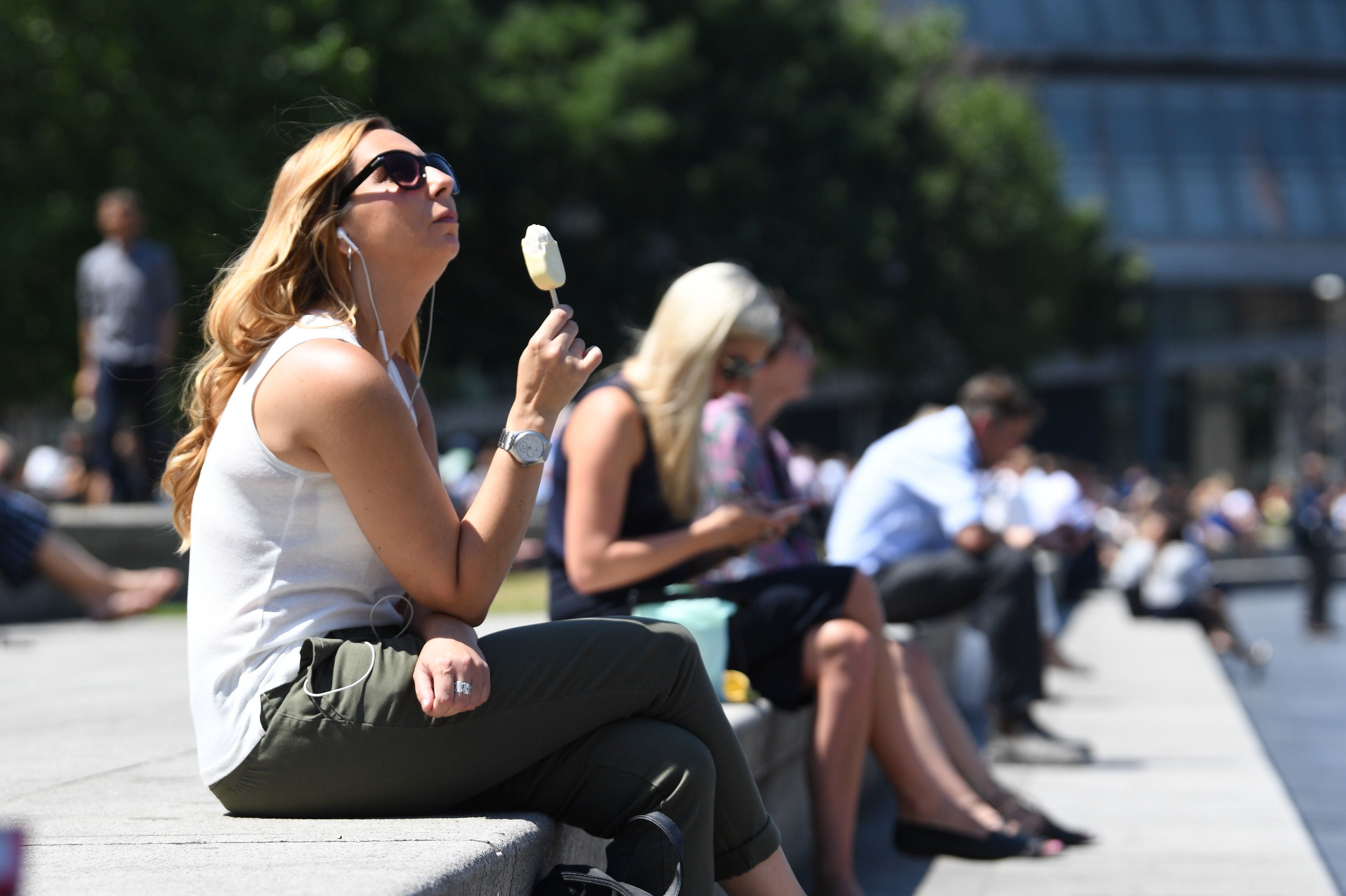This website uses cookies so that we can provide you with the best user experience possible. Cookie information is stored in your browser and performs functions such as recognising you when you return to our website and helping our team to understand which sections of the website you find most interesting and useful.
Support truly
independent journalism
Our mission is to deliver unbiased, fact-based reporting that holds power to account and exposes the truth.
Whether $5 or $50, every contribution counts.
Support us to deliver journalism without an agenda.

Louise Thomas
Editor
Is there anything more quintessentially British than complaining about the weather? A fortnight ago we were griping that it was too cold. This week we’re grumbling that it’s too hot. We’re basically Goldilocks at this point.
During the hot weather the UK has endured this week, I couldn’t help but feel a flicker of guilt every time I bemoaned that my clothes were stuck to my frame with sweat as I travelled on the tube, or that my high-energy Zumba class was nigh-on unbearable in the unaired heat of the local sports centre. What right did I – did any of us – have to complain, after months of carping about the washout that was April, May and most of June? Surely we should simply appreciate the gift of a few days of sun and the mercury finally rising to an acceptable level?
This guilt was also tinged with embarrassment. Let’s be frank – it hasn’t even been that hot. We’ve barely pushed above 25C. The rest of the world must be laughing at us, wilting in temperatures a full 10-15C below what they would consider spicy.
But then a recent Twitter/X thread by an American explaining that, in fact, the UK wasn’t a nation of total pansies caught my eye and assuaged my shame.
“I’m gonna explain to y’all why Britain considers 78F/25C hot,” wrote Josh Ellis. “I know hot because I grew up in Texas and spent half my life in Las Vegas. So I am absolutely qualified to explain this to the rest of you who laugh at UK ‘heatwaves’.”

He went on to hypothesise that humidity played a significant role in Britain feeling hotter than its modest temperatures would suggest: “l’m outside right now and it’s 76F [24C] and 53 per cent humidity and it feels like I’m in a sauna. Thank God the clouds are out because earlier it was really unpleasant. Understand me when I tell you I am used to heat most of you can’t imagine. This is still nasty and gross to me.”
His theory has legs, Jim NR Dale, senior meteorologist at British Weather Services and co-author of Surviving Extreme Weather, tells me. “You can go to a desert that’s over 30C in, say, Tunisia, and it’s very hot but it’s a dry heat,” he says. “Whereas here, if we get humidity into the atmosphere as we’ve seen over the last few days, that mixture is very different. With humidity, we experience the inability to lose sweat from the skin’s surface to cool us down in a natural way.”
Dr Simon Keeling of Weather Consultancy Services agrees that the humidity has been high “and that’s why it’s feeling much hotter than the recorded temperatures at the moment. If the air were drier, then the heat would feel far more comfortable, a little like it does when you go into Europe with temperatures of 30 to 35C and, although it’s hot, it really doesn’t feel that uncomfortable.”
It’s the same reason heat in tropical climates such as Thailand and Malaysia feels much tougher to endure than dry, desert countries in the Middle East and north Africa. “It’s not as bad here as in south Asia, but nonetheless, because of that injection of moisture in the atmosphere, it feels uncomfortable – like you can’t do anything,” says Dale. “Even in your own home you can still feel that humidity. It induces a lazy, languid, sleepy feeling.”
With humidity we experience the inability to lose sweat from the skin’s surface to cool us down in a natural way
Jim NR Dale, senior meteorologist
He also puts it down to Brits’ lack of experience when it comes to extreme temperatures – hot or cold. “We live in a temperate climate and so obviously we cope less well when temperatures are extreme in either direction; we’re not used to it,” he adds.
But our infrastructure also plays a major part in making the UK seem sweltering. Our buildings and transport systems weren’t originally designed with cooling in mind. “The houses are built to retain heat, not circulate breezes,” tweeted Ellis. “The climate has always been coldish-cool and it’s crazy humid. Like Florida humid. It rains a lot. The closest climate to it I’m familiar with is Seattle. Know what people in climates like that don’t have? Air conditioning. They didn’t need it until recently.”
The World Economic Forum published a warning in 2022 that UK infrastructure is “under threat” when dealing with temperatures it’s unequipped to handle. Currently, 20 per cent of existing infrastructure is at risk of overheating, and this “will rise as average temperatures continue to increase”. And this isn’t just referring to buildings, but rail, road, water pipes, our electricity grid… Meanwhile, the UK and Switzerland are two of the countries that need to adapt the most for global heating, scientists have predicted, with both likely to see a 30 per cent increase in the number of days of uncomfortably hot temperatures if the world heats by 2C.
While the UK has a big diversity when it comes to housing stock, a particular issue is new-build flats in cities, says Dr Ben Roberts, a lecturer in building energy at Loughborough University who specialises in mitigating the risks of extreme heat. “Flats tend to be the most high-risk dwelling types,” he says. It could be because they have less chance to cross-ventilate – you usually can’t open windows on different sides of the building to let air flow through – and the building designs themselves don’t help. Big windows, though they may look flash in architects’ plans, are a nightmare when it comes to keeping flats cool. Ground floor flats have security issues when it comes to leaving windows open overnight; top floor flats are less shaded and may sit under an uninsulated flat roof where the sun beats down all day, while heat also rises from below.

“We’re seeing more people move towards cities, so flats are becoming more common,” adds Dr Roberts. “And cities are hotter anyway in the urban heat island.”
This refers to the effect whereby big towns and cities, packed with far more concrete and tall buildings than rural areas, absorb heat during the day and radiate it back out when the sun goes down, “preventing temperatures falling as they may have used to do overnight”, says Dr Keeling. “That also means that the base temperature in the morning to start the day is higher and so daytime temperatures can rise higher too.”
So, is air conditioning the answer? Only around 5 per cent of UK households currently have AC, compared to 90 per cent of the US. The strain it would put on the power grid were every property to get air con would be enormous at a time when we’re trying to reduce our electricity consumption. One 2021 government report predicted that AC use could spike the UK’s energy use by up to 15 per cent during the summer by the year 2100. “The electricity grid may not cope with mass air con,” warns Dr Roberts. “We’d need to reinforce the grid to cope with that kind of demand.”
Though he concedes that in the next hundred years the climate may have warmed to the extent that AC could be a necessity, particularly in cities where issues around noise and security mean it’s not viable to ventilate buildings, he’s wary of potential fuel poverty. “We may have an issue where we have summer fuel poverty because AC is expensive to run,” he argues. “So we really should take every passive measure we can before moving to AC.” (Not to mention the fact that AC produces the very carbon emissions responsible for the global warming that necessitates AC use in the first place.)
We may have an issue where we have summer fuel poverty because AC is expensive to run
Dr Ben Roberts
Passive cooling can involve simple measures, with much of it (excuse the pun) boiling down to the triple threat of shading, insulation and ventilation. Dr Robert sums it up thus: “Overheating is simple – don’t let heat in in the first place and, if it does get in, make sure you can get it out again. It’s just a heat balance.” That means taking steps like investing in external shading that stops heat getting in; proper insulation and thick walls that, conversely, keep heat out as much as they keep it in; and ventilation that releases the heat that’s accumulated back out again.
The government acknowledged that overheating was a pressing problem and updated building regulations in 2022 accordingly, stipulating that overheating of newbuilds has to be prevented through better design (such as eschewing those massive windows beloved by architects). In London, following 2022 extreme summer temperatures that rose to over 40C, mayor Sadiq Khan pledged £3.1m for a new tree-planting package to future-proof the city and help keep it cool through shading and evapotranspiration (the movement of water from land into the air).
Want to cool down before these potential future measures kick in? The experts’ final advice is, counterintuitively, to keep your windows shut during the day. “It’s the wrong thing to open your windows, definitely,” says Dr Roberts. And he should know – he did a whole PhD looking at when to open them. “If it’s hotter outside than inside, your windows should be closed, because all you’re doing otherwise is letting hot air in. We encourage night ventilation – there’s a build-up of heat in the house during the day, and a drop in temperature outside at night.” If you can, open your windows when you go to bed – as many as possible to get a cross-breeze going and air circulating – and close them again when you wake up in the morning.
And feel free to keep complaining that it’s just too damn hot right now; science is officially on your side.



 Africana55 Radio
Africana55 Radio 
